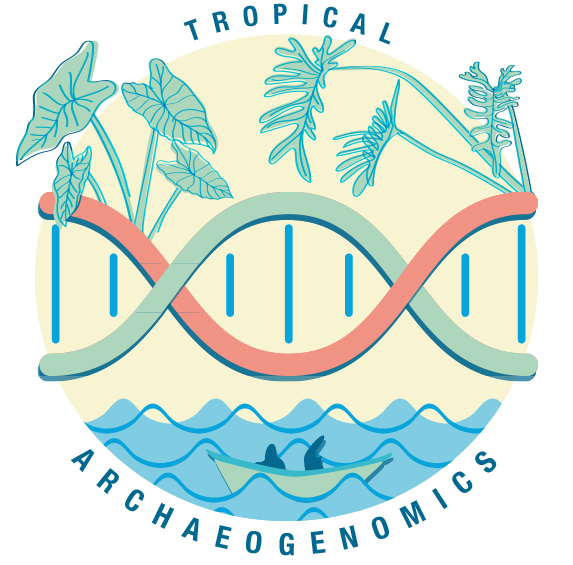Otto Hahn Research Group for Tropical Archaeogenomics

The Otto Hahn Award is bestowed by the Max Planck Society every year to particularly worthy recipients of the Otto Hahn Medal. The award provides for a long-term research residency abroad, followed by leadership of a research group on the scientist's own research topic at one of the Max Planck Institutes. The award is intended to pave the way for a long-term scientific career in Germany.
In 2021, Kathrin Nägele received the Otto Hahn Award in recognition of her thesis “An ancient genomic perspective on the human dispersals to tropical islands – implications for the settlement history of the ancient Caribbean and the Pacific”.
Ancient DNA in tropical regions
The warm and humid climate of tropical regions presents exceptional challenges for DNA preservation. The accelerated decay of DNA molecules leads to very short fragment lengths and high rates of chemical damage on the molecules withing a short time. Only by combining several methods such as NGS sequencing, targeted enrichment of human DNA and sampling of elements with high rates of DNA preservation can we reconstruct the genomes of the ancient inhabitants of these regions.
Additionally, tropical regions have been and continue to be severely impacted by the European invasions in the modern era. With European invasion came diseases, massacres, and forced labor, diminishing the numbers among the Indigenous populations. Forced displacement both on a global and regional scale, such as the transatlantic slave trade or the practice of blackbirding (enslaved by deception) in the Pacific Ocean, has changed the geographic distribution of Indigenous populations. As a result, the linguistic, cultural, and genetic landscape has changed dramatically. Furthermore, written accounts of the people inhabiting the islands at European contact are available solely from the colonizers, biased by the “European gaze” and individual agendas. These circumstances make it difficult to impossible to reconstruct population histories from present-day populations.
Topics

Topic 1: Caribbean Population History
As a result of the colonial invasion the only information about the indigenous past of the Caribbean comes from limited sources. The accounts of the chroniclers are biased by their world view and often pushing a political agenda. Using archaeogenomic methods, we aim to understand various unresolved questions in Caribbean human history:
- The origin and genetic diversity of the first settlers of the Caribbean
- The demographic processes at the transition from the Archaic to the Ceramic Age
- Interactions in the early colonial period in the Caribbean
These projects are realized in collaboration with:
Topic 2: Circum-Caribbean Population History

The majority of Caribbean islands were never connected to the American mainlands. Still, the continents must have been the source of the dispersals to the islands. Only few ancient genomes from the Circum-Caribbean are recovered to date, and the lack of data significantly impacts the models and inferences. To anchor the Caribbean islands in the mainland, an investigation of the surrounding and connecting regions is imperative. Therefore, we will increase the data availability by investigating target regions in more detail:
- Yucatan, Belize, Nicaragua and the Nicaraguan Rise
- Suriname, Trinidad and the dawn of the Ceramic Age
- Connections of Koriabo pottery makers to the Caribbean and the extensions into the Amazon
These projects are realized in collaboration with:
Topic 3: Pacific Population History

The Pacific Ocean covers a third of our planet, and connects about 25 000 islands. The Pacific region can be separated in two geographic regions: Near Oceania, stage to one of the earliest dispersals, and Remote Oceania, stage of one of the latest settlements in human history. Traditionally, a history of two dispersals has been assumed, and the vast waterscapes - interpreted as insurmountable barriers - served as an explanation for the simplistic reconstruction. Genetic evidence has already been used to question simplistic models; however, many were limited by basing models on simplistic narratives. In the Pacific, a detailed sampling of the different islands is key to understanding the complex history and interactions between the regions and islands. We seek to add to the understanding of the population history by investigating processes in both major regions.
- Near Oceanian genetic diversity and exchange
- Settlement of Central Oceania and contact with the Americas
- The role of the Philippines and Micronesia in the settlement of Remote Oceania
These projects are realized in collaboration with:
Our Philosophy
We believe that establishing mutually beneficial collaborations and developing a culture of new relational ethics should be the core idea of any project realized. Involving participating descendant communities is an integral part of changing the impact of our research in a complex political environment that is still partly colonial. As ancient DNA is used to reconstruct human history, it impacts local identities and can be used and abused in political agendas and discussions about land rights. Establishing new relational ethics will ensure the research’s legality and contribute not only to ethical collaboration but to the answering of integral questions about our human past.